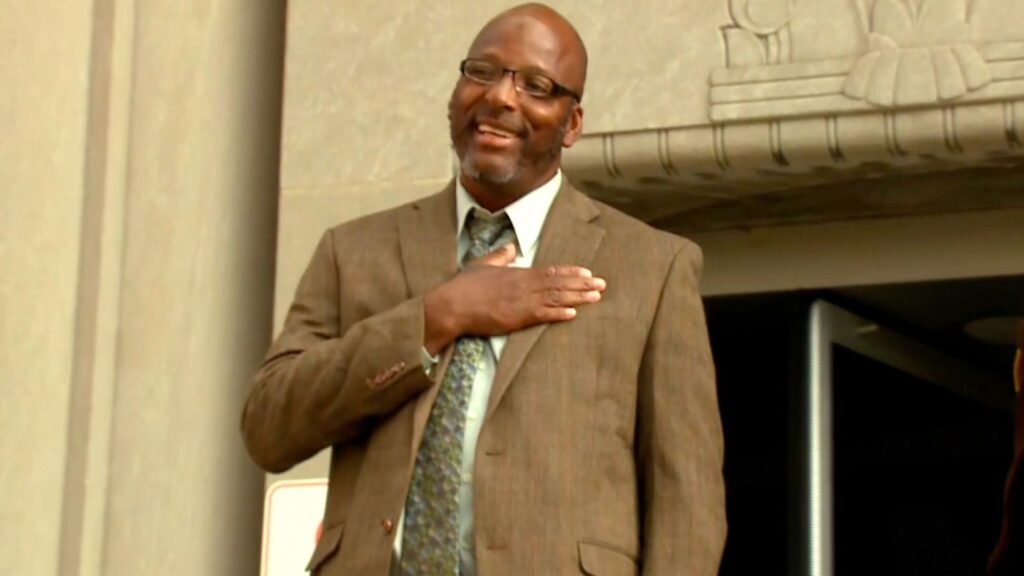Christopher Dunn’s case has shaken the foundations of the justice system. After spending 34 years in prison, Dunn has finally been freed following the overturning of his 1991 murder conviction. This landmark decision has drawn attention to the complexities and potential flaws within the criminal justice process, sparking debates about wrongful convictions and the importance of ongoing legal review.
The journey to Christopher Dunn’s release has been long and arduous. His case highlights the challenges faced by individuals who claim innocence while serving lengthy sentences. The overturning of Dunn’s conviction and his subsequent release have far-reaching implications for similar cases and could lead to changes in how the justice system handles potential wrongful convictions. This article delves into the details of Dunn’s case, the process of overturning his conviction, and the broader impact of his release on the legal landscape.
The Case Against Christopher Dunn
Original conviction details
The case against Christopher Dunn stemmed from a shooting incident on May 19, 1990, in St. Louis’ Wells-Goodfellow neighborhood. The incident resulted in the death of fifteen-year-old Ricco Rogers, who was struck in the head by a bullet . Dunn, who was 18 at the time, was convicted of first-degree murder in 1991 and sentenced to life in prison without the possibility of parole .
Key witness testimonies
The prosecution’s case relied heavily on the testimony of two young witnesses: DeMorris Stepp, 14, and Michael Davis Jr., 12 . Both initially identified Dunn as the shooter . However, their testimonies have since been called into question. Davis later admitted to lying, claiming he did so because he thought Dunn was affiliated with a rival gang . Stepp’s account has changed multiple times over the years .
Evidence presented at trial
The case against Dunn was based entirely on the eyewitness testimony of Stepp and Davis, with no physical evidence linking Dunn to the murder . The prosecution reportedly presented the murder as the result of a fight between gang “wannabes” . Dunn maintained his innocence, claiming he was at his mother’s home at the time of the shooting . A childhood friend, Nicole Bailey, testified that she spoke with Dunn by phone that night, corroborating his alibi .
Overturning the Conviction
New evidence uncovered
In 2020, Texas County Circuit Court Judge William Hickle found significant evidence of Christopher Dunn’s innocence . Despite this finding, Hickle was unable to free Dunn due to Missouri law limitations at the time . The case took a turn when St. Louis Circuit Attorney Gabe Gore created a conviction integrity unit to examine claims of innocence .
Witness recantations
The original conviction relied heavily on the testimony of two young witnesses, DeMorris Stepp and Michael Davis Jr., who were 14 and 12 years old at the time . Both witnesses later recanted their testimonies . Davis admitted to lying, claiming he did so because he thought Dunn was affiliated with a rival gang . Stepp’s account has changed multiple times over the years .
Circuit Attorney’s motion to vacate
In February 2024, Gore filed a motion to vacate Dunn’s conviction . After a hearing in May, Judge Jason Sengheiser granted the motion, overturning Dunn’s conviction for first-degree murder and other charges . Sengheiser’s ruling stated that Gore had made a clear and convincing show of ‘actual innocence’ that undermined the basis for Dunn’s convictions . The judge concluded that no reasonable juror would have voted to find Dunn guilty beyond a reasonable doubt in light of the new evidence .
Dunn’s Release and Its Implications
Legal battles for freedom
Christopher Dunn’s journey to freedom was fraught with legal hurdles. Despite Judge Jason Sengheiser overturning his conviction and ordering his immediate release, Dunn faced opposition from Missouri Attorney General Andrew Bailey’s office . The Attorney General’s appeal to the Missouri Supreme Court temporarily halted Dunn’s release, even as he was preparing to walk out of prison . This legal tug-of-war highlighted the complexities in addressing potential wrongful convictions.
Impact on wrongful conviction cases
Dunn’s case has significant implications for similar situations. It marks the second “actual innocence” ruling in Missouri in recent weeks, following Sandra Hemme’s release after 43 years of imprisonment . The 2021 Missouri law allowing prosecutors to request hearings for potential wrongful convictions played a crucial role in Dunn’s case . However, the Attorney General’s consistent opposition to such releases has raised questions about the balance between maintaining convictions and pursuing justice.
Dunn’s life after release
After spending 34 years behind bars, Dunn’s release marks a significant turning point in his life . The Midwest Innocence Project, which represented Dunn, expressed their commitment to supporting him as he rebuilds his life . However, the transition to freedom after decades of imprisonment presents its own set of challenges. Dunn’s case serves as a stark reminder of the lasting impact of wrongful convictions and the importance of ongoing legal review in the criminal justice system.
Conclusion
Christopher Dunn’s case serves as a powerful reminder of the flaws in our justice system and the lasting impact of wrongful convictions. His release after 34 years behind bars highlights the crucial need to review and reassess cases where new evidence comes to light. The overturning of Dunn’s conviction has an influence on similar cases and could lead to changes in how potential wrongful convictions are handled.
To wrap up, Dunn’s journey to freedom underscores the importance of ongoing legal review and the need for a balanced approach to maintain convictions while pursuing justice. As Dunn begins to rebuild his life, his case continues to spark debates about the complexities of the criminal justice process. This serves as a call to action to improve the system and prevent similar injustices in the future.
FAQs
What was Christopher Dunn accused of?
Christopher Dunn was found guilty of first-degree murder related to the 1990 shooting death of 15-year-old Ricco Rogers. In February, St. Louis Circuit Attorney Gabe Gore submitted a motion to overturn this conviction.
